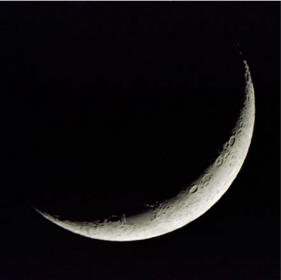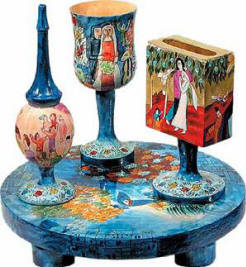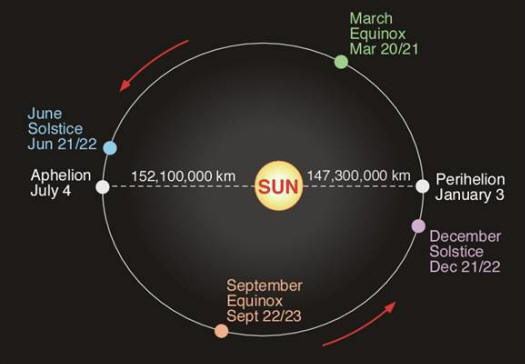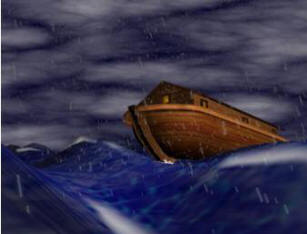
The
Seven-Feasts of Israel:
the First and Second Coming of Messiah
3. The Timing of the Feasts of Israel

The seven feasts of Israel in Leviticus reveal God’s prophetic calendar of redemption for humanity. Calendars play an important role in redemption because the mark the time of events. The Lord in Genesis 1:1 began “time” when he created the universe of matter and space. He said in the “beginning” God created, therefore time began at the creation. The accounting for time was also set in motion in Genesis 1, on the 4th day God created, the Sun, Moon and Stars for light and time.
Therefore to better understand God’s prophetic calendar we need to understand the basis of time used in the calendars.
The Jewish Day
When does the day begin? For most people in the west the day begins at 12:00 AM and moves forward from there to the next day. The recognition is largely a Roman based system, the Biblical system is different, the day begins at sundown and continues until sundown the next day. Six times Genesis Chapter 1 speaks of the day as “the evening and the morning” (Genesis 1:5,8,13, 19, 23, 31). The day of atonement, Yom Kippur was to be kept from evening to evening.
32 It shall be to you a sabbath of solemn rest, and you shall afflict your souls; on the ninth day of the month at evening, from evening to evening, you shall celebrate your sabbath.” Leviticus 23:32
The Jewish Week
Why are there only 7 days in a week? Why do people all over the earth use a seven day week? Even those who would deny the Bible still follow a seven day week. The pattern was set in motion at the creation. God created the heavens and the earth in six days and rested on the seventh day, man created in his image was use the 7-day unit as a division in time.
The Hebrew word for week comes from the Hebrew word for seven שָׁבוּעַ (shabuwa). The English names for the days of the week are derived from pagan mythology, for example Thursday is derived from “Thor’s day”[1]. The Biblical names for the week are based on their order number such as “First day”, Second day and so forth. The Seventh day is set apart as holy and sacred day of rest, called the “Sabbath”. On this day Israel was forbidden to work, since the nation was to model the Lord to the nations.
15 Work shall be done for six days, but the seventh is the Sabbath of rest, holy to the LORD. Whoever does any work on the Sabbath day, he shall surely be put to death. Exodus 31:15
 The
Sabbath was to be specifically set aside from the other six days of the
week. Israel was to meet on this day and celebrate the Lord through a “Holy
Convocation” (Gathering) (Leviticus 23:3). On this day all types of work,
travel was to be strictly restricted, this was a day set aside to honor the
Lord. The “Sabbath” was a sign of the covenant between Israel and the Lord
God.
The
Sabbath was to be specifically set aside from the other six days of the
week. Israel was to meet on this day and celebrate the Lord through a “Holy
Convocation” (Gathering) (Leviticus 23:3). On this day all types of work,
travel was to be strictly restricted, this was a day set aside to honor the
Lord. The “Sabbath” was a sign of the covenant between Israel and the Lord
God.
16 Therefore the children of Israel shall keep the Sabbath, to observe the Sabbath throughout their generations as a perpetual covenant. 17 It is a sign between Me and the children of Israel forever; for in six days the LORD made the heavens and the earth, and on the seventh day He rested and was refreshed.’” Exodus 31:16-17
The Sabbath is a sacred time in the Jewish home it is called to be a “Holy Convocation” a gathering where the Lord God is remembered. Sabbath candles are lit on Friday at sundown in the observant Jewish house by the mother. The Father then pours the wine and recites the Kiddush, prayer of sanctification, over the cup of wine. At the Sabbath there is also a special dinner along with Hallah bread served with a white table cloth. This instills the importance of the Sabbath in generations to come as the children grow, the meaning and sanctification of this day are instilled in the hearts and minds of the family.
The Sabbath begins on Friday Evening and ends on Saturday evening, at the closing of the Sabbath there is a Havdalah ceremony (separation). The purpose is to separate the holy from the secular.
A cup of wine is filled to overflowing demonstrating the joy of the Sabbath. The cup is held in the right hand with the following blessing recited: “Blessed art Thou, O Lord our God, King of the universe, who creates the fruit of the vine.” A blessing is then said over a decorated box of spices, as the Sabbath passes the family smells the fragrance of the spices. Then a blue and white braded candle is lit as the Sabbath draws to a close with a blessing recited over it. The Sabbath is a time of remembrance in the Jewish house, where the Lord is the focus over the secular.
The Jewish Month
The Hebrew Calandar is lunar, based on the appearance of the thin crescent moon at the beginning of the month, the “New moon”. This occurs ever 29 ½ days, therefore the length of the Month is between 29 and 30 days. The Hebrew word for month is Hodesh the same word used for moon. The English word for Month is derived from the word Moon.
Biblical Observance for the New Moon
The New Moon was a sacred time in Israel. In the book of Numbers, we read;
10 Also in the day of your gladness, in your appointed feasts, and at the beginning of your months, you shall blow the trumpets over your burnt offerings and over the sacrifices of your peace offerings; and they shall be a memorial for you before your God: I am the LORD your God.” Numbers 10:10
14 With each bull there is to be a drink offering of half a hin [a] of wine; with the ram, a third of a hin [b] ; and with each lamb, a quarter of a hin. This is the monthly burnt offering to be made at each new moon during the year. Numbers 28:14
The first day of the month was known as Rosh Hodesh (Head of the month). Special sacrifices were offered on this day along with the blowing of trumpets (Psalm 81:3). Biblically we see David miss the “New moon” festival at the table of Saul.
23 And about the matter you and I discussed—remember, the LORD is witness between you and me forever." 24 So David hid in the field, and when the New Moon festival came, the king sat down to eat. 25 He sat in his customary place by the wall, opposite Jonathan, [a] and Abner sat next to Saul, but David's place was empty. I Samuel 20:23-24
The start of the month was confirmed by the Priests and later the Sanhedrin, the council of seventy rulers. The rulers would sanctify (separate) this month from the previous, when the crescent moon was witnessed. This was then telegraphed throughout the Jewish community via signal fires for hundreds of miles.
Modern Observance
The Modern celebration of Rosh Chodesh (New Moon) includes the Avodah, the prayer for the Temple’s restoration (Ya’a’le Ve-Yavo). If the Sabbath falls on the last day of the month, the I Samuel 20 is read, where Jonathan and David observance of the New Moon is noted. Synagogue services on the New Moon include the Hallel (Psalms 113-118) and a reading of Numbers 28:1-15.
Future Observance
David celebrated the New Moon in the days of Saul and Jonathan is clearly seen from 1 Samuel 20. David will also celebrate the New Moon in the Messianic Kingdom[2] when Jesus reigns as King over the earth. Through the line of King David was the Messiah established in scripture, God will fulfill his promises in the Kingdom of God. David plays a role in Israel’s redemption and restoration. The Book of Ezekiel was written more then 400-years after David, yet it looked forward to resurrected King David in the Kingdom to come.
25 Then they shall dwell in the land that I have given to Jacob My servant, where your fathers dwelt; and they shall dwell there, they, their children, and their children’s children, forever; and My servant David shall be their prince forever. Ezekiel 37:25
Jesus reigns as King over the Earth, as the Lord of Hosts, David along with the rest of the saints will rule and reign with him. In the Messianic Kingdom, the 12 disciples will rule over the 12 tribes of Israel according to Matthew 19:27.
16 And it shall come to pass that everyone who is left of all the nations which came against Jerusalem shall go up from year to year to worship the King, the LORD of hosts, and to keep the Feast of Tabernacles. 17 And it shall be that whichever of the families of the earth do not come up to Jerusalem to worship the King, the LORD of hosts, on them there will be no rain. Zechariah 14:16-17
David will lead the “New Moon” worship services before the Lord. He is referred to as the “the prince” in Ezekiel 46.
1 ‘Thus says the Lord GOD: “The gateway of the inner court that faces toward the east shall be shut the six working days; but on the Sabbath it shall be opened, and on the day of the New Moon it shall be opened. 2 The prince shall enter by way of the vestibule of the gateway from the outside, and stand by the gatepost. The priests shall prepare his burnt offering and his peace offerings. He shall worship at the threshold of the gate. Then he shall go out, but the gate shall not be shut until evening. 3 Likewise the people of the land shall worship at the entrance to this gateway before the LORD on the Sabbaths and the New Moons. 4 The burnt offering that the prince offers to the LORD on the Sabbath day shall be six lambs without blemish, and a ram without blemish; Ezekiel 46:1-4
When the Lord created the Sun, Moon and Stars, He created to mark the time on the earth. In the Kingdom to come, the “New Moon” will be celebrated by all the nations, not only Israel. Israel will be the chief nation on the Earth (Deut. 28:1), when they are obedient to the Lord.
22 "As the new heavens and the new earth that I make will endure before me," declares the LORD, "so will your name and descendants endure. 23 From one New Moon to another and from one Sabbath to another, all mankind will come and bow down before me," says the LORD. 24 "And they will go out and look upon the dead bodies of those who rebelled against me; their worm will not die, nor will their fire be quenched, and they will be loathsome to all mankind." Isaiah 66:22-24
The Jewish Year
 The
Gregorian Calendar
The
Gregorian Calendar
Our current calendar is a solar calendar based on the time it takes the earth to revolve around the sun and arrive at the same place in a period of time. The time involved takes 364.242 days. The Romans under Julius Caesar devised the Julian calendar in 45 B.C. The Calendar had 365 days per year and a leap year every 4-years to account for the extra time per solar year. However it was soon understood, that the Julian Calendar was still missing time, since it took the earth 365.242 days not just 365.25 to revolve around the earth.
Therefore Pope Gregory in 1582 issued an edict where he declared the century divisible by 400 would be leap years (1600,2000,2400). During these centuries an extra day would be added to sync the Calendar back to the sun, the name of this calendar was known as the Gregorian calendar.
The Hebrew Calendar
Based on New Moons as the start of the month Jewish Calendar is called Lunisolar, because the Moon revolves around the earth every 29 ½ days, nearly 12 times in a solar year (354 days). That means a Lunar year is about 11-days short of a Solar year. Therefore, Passover would be celebrated earlier as the years passed since every year would be 11-days short. The “Holy Days” were to be kept in their appointed seasons(Num. 9:2-3), these seasons were solar. Passover was to be observed at Spring. Therefore, the timing of the Solar and the Lunar had to be re-synched every so often.
The Solar and Lunar Calendars were reconciled with a 19-year cycle. Every third, sixth, eighth, eleventh, fourteenth, seventeenth and nineteenth years were to be leap years. During these years an extra day was added the month of Adar and a 13th Month was added to the Calendar known as “Second Adar”
The Jewish calendar is lunisolar—i.e., regulated by the positions of both the moon and the sun. It consists usually of 12 alternating lunar months of 29 and 30 days each (except for Ḥeshvan and Kislev, which sometimes have either 29 or 30 days), and totals 353, 354, or 355 days per year. The average lunar year (354 days) is adjusted to the solar year (365 1/4 days) by the periodic introduction of leap years in order to assure that the major festivals fall in their proper season. The leap year consists of an additional 30-day month called First Adar, which always precedes the month of (Second) Adar. A leap year consists of either 383, 384, or 385 days and occurs seven times during every 19-year period (the so-called Metonic cycle). Among the consequences of the lunisolar structure are these: (1) The number of days in a year may vary considerably, from 353 to 385 days. (2) The first day of a month can fall on any day of the week, that day varying from year to year. Consequently, the days of the week upon which an annual Jewish festival falls vary from year toyear despite the festival's fixed position in the Jewish month[3]
This is the reason Passover sometimes occurs in April and other times in March.
Two Calendars
Biblical Calendar
When the Israel was in the wilderness of Sinai God assigned Nisan to be the “First month” of the year to them. This is the month Israel was freed from Egyptian bondage.
1 Now the LORD spoke to Moses and Aaron in the land of Egypt, saying, 2 “This month shall be your beginning of months; it shall be the first month of the year to you. Exodus 12:1-2
Prior to the Exodus, Israel calendar was linked to the harvest times in the land. The conclusion of the harvest signaled the end of the year. The beginning of the harvest was the start of the year.
16 and the Feast of Harvest, the firstfruits of your labors which you have sown in the field; and the Feast of Ingathering at the end of the year, when you have gathered in the fruit of your labors from the field. Exodus 23:16
Therefore the Nisan became the first of the religious year, while the seventh month Tishri became the first of the commercial year. Once the Temple was destroyed the Feast of Trumpets had a diminished role since sacrifice required a Temple. So the first of Tishri became known as “Rosh Hashanah” (Head of the Year) since it was the start of the civil new year.
Josephus the Jewish historian records how the calendar switched from Tishri to Nisan in the time of Moses. He writes,
“Moses appointed that Nisan….should be the first month for their festivals, because he brought them out of Egypt in that month: so that this month began the year as to all the solemnities they observed to the honor of God, although he preserved the original order of the months as to selling and buying, and other ordinary affairs” (Antiquities of the Jews 1.3.3)
 Biblical
Calendar
Biblical
Calendar
The Biblical Year is 360-days / year.
Genesis records Noah’s Ark was in the waters for 5-months (Gen7:11; 8:4) for the equivalent of 150-days. Therefore 30-days are assigned to a month, and 12 months are noted in a year. Revelation and Daniel also list 1260 days as 3 ½ years of 30 days each month for 42 months.
[1] http://www.etymonline.com/index.php?search=thursday&searchmode=none
[2] The Messianic Kingdom is the Millennial Kingdom of 1000-years, where Jesus Christ will reign over the earth at the end of the tribulation. Satan is bound during this time, the saints are rewarded for their service and resurrected (Revelation 20:1-7).
[3] Encyclopedia Britanica 2004, Jewish Calendar.